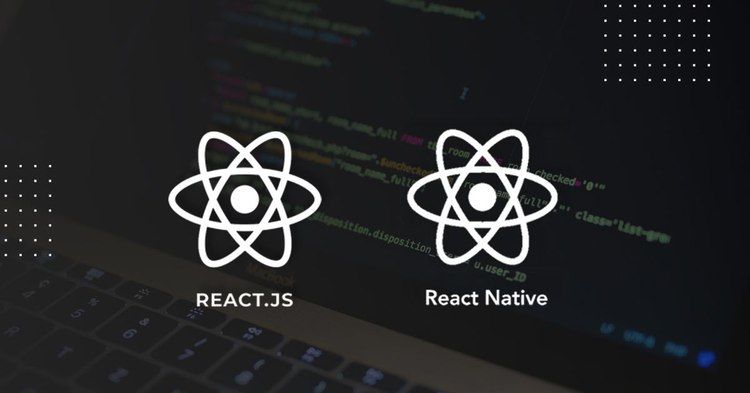React Native vs. ReactJS: What's the Difference?
React Native vs. ReactJS: What's the Difference?
ReactJS and React Native are two popular frameworks used in web and mobile app development. Both are backed by Facebook, and they share some similarities. However, they are not the same thing. If you're a developer or a business owner trying to decide between the two, you need to understand their differences, advantages, and limitations. Here, we'll explore the differences between ReactJS and React Native, and help you make an informed decision.
What Is ReactJS?

ReactJS is a JavaScript library used for building user interfaces. Developed by Facebook, it has gained immense popularity in the web development community due to its unique features and ease of use. React development services allow businesses to build complex UI components by breaking them down into smaller, reusable pieces called "React Components". These components can then be easily combined to create a full-fledged web application.
React's popularity can be attributed to several factors. One of the main advantages of React is its virtual DOM (Document Object Model) implementation. React development services use a virtual DOM, which is a lightweight representation of the actual DOM, to make updates to the UI faster and more efficient. Instead of updating the entire DOM tree, React only updates the components that have changed, leading to a significant improvement in performance.
Another advantage of ReactJS development services is its focus on declarative programming. With React, developers only need to specify what they want the UI to look like and let React development services take care of the how. This makes it easier to write and maintain code, as developers don't need to worry about managing the state of the application manually.
ReactJS development services also have a large and active community, with many open-source libraries and tools available to developers. This makes it easier to find solutions to common problems and get help when needed.
What Is React Native?
React Native is a framework for building mobile applications using ReactJS development services. It allows developers to build native mobile apps for both iOS and Android platforms using a single codebase. Like React, React Native uses a declarative programming model, making it easier to write and maintain code.
React Native allows developers to use the same basic building blocks as they would for building web applications with React. However, instead of rendering to HTML, React Native uses native UI components to render to mobile devices. This provides a more seamless and native-like experience for the end user.
React Native also has a number of built-in features that make it easier to build mobile applications. For example, it includes support for native animations, making it easier to create engaging and interactive user interfaces. It also includes a hot reloading feature, allowing developers to see changes to the application in real time without having to rebuild the entire app.
Key Differences Between ReactJS and React Native

While React and React Native share many similarities, there are also some key differences between the two.
The most obvious difference is that ReactJS development services are used for building web applications, while React Native is used for building mobile applications. While both frameworks use the same basic programming model, the way they render UI components is different. ReactJS uses HTML and CSS to render UI components, while React Native uses native components like buttons and text fields to render to mobile devices.
Another key difference is that React Native includes a number of built-in features specific to mobile development. For example, it includes support for geolocation, camera access, and push notifications, making it easier to build feature-rich mobile applications. ReactJS, on the other hand, is more focused on building web applications and does not include these mobile-specific features out of the box.
Finally, while both ReactJS and React Native have large and active communities, the two communities are somewhat distinct. This means that the libraries, tools, and resources available for each framework may differ slightly. As a result, developers may need to learn different sets of tools and techniques when working with ReactJS versus React Native.
Pros and Cons of ReactJS for Web Development
ReactJS is a popular JavaScript library used for building user interfaces. It was developed by Facebook in 2011 and has been used by many large companies such as Airbnb, Netflix, and Instagram. A React development company is known for its ability to create reusable UI components, which can be used to build complex user interfaces quickly and efficiently.
Let's take a look at some of the pros and cons of using React JS for web development:
Pros
Reusable components: One of the biggest advantages of ReactJS is its ability to create reusable UI components. This means that developers can create components once and reuse them throughout their application, which can save time and reduce code complexity.
Fast rendering: ReactJS uses a virtual DOM, which allows it to update the UI efficiently and quickly. This means that users can experience fast page load times and smooth UI interactions.
Strong community support: ReactJS has a large and active community of developers who contribute to its development and provide support through online forums and resources. This means that developers can access a wealth of knowledge and resources when using ReactJS.
Cons
Steep learning curve: ReactJS can be difficult to learn for beginners, as it requires a good understanding of JavaScript and other web development technologies. This can make it challenging for developers who are new to web development.
Boilerplate code: ReactJS requires a significant amount of boilerplate code to set up, which can be time-consuming and complex.
Limited functionality: ReactJS is primarily used for building user interfaces and does not have built-in support for other web development tasks such as routing and state management. This means that developers may need to use additional libraries or tools to complete these tasks.
Pros and Cons of React Native for Mobile App Development

React Native is a mobile app development framework that allows developers to build native mobile apps using JavaScript. It was developed by Facebook in 2015 and has been used by many large companies such as Uber, Instagram, and Airbnb. React Native is known for its ability to create high-performance, cross-platform mobile apps quickly and efficiently.
Let's take a look at some of the pros and cons of using React Native for mobile app development:
Pros
Cross-platform development: React Native allows developers to build native mobile apps for both iOS and Android using a single codebase. This can save time and reduce development costs, as developers do not need to write separate code for each platform.
Fast development: React Native allows developers to create mobile apps quickly and efficiently, as it uses a simple and intuitive programming model.
Access to native functionality: React Native provides access to native device functionality such as camera, GPS, and contacts. This means that developers can create mobile apps that have the same look and feel as native apps.
Cons
Limited functionality: React Native does not have support for all native functionality, which can limit the functionality of mobile apps. Developers may need to use additional libraries or tools to complete certain tasks.
Performance issues: While React Native is known for its high performance, it can still have performance issues in certain situations. This is because it uses JavaScript, which can be slower than native code.
The Advantages of Hiring a ReactJS Development Company

React Js is a popular JavaScript library that is primarily used for building web applications. It is a lightweight, efficient, and easy-to-learn library that is widely adopted by developers all around the world. ReactJS is a great choice when building web applications that need to be accessible from a variety of devices, such as desktops, laptops, tablets, and smartphones. ReactJS is also an excellent choice when building complex web applications that require a high level of interactivity, such as social media platforms, online marketplaces, and e-commerce websites.
One of the biggest advantages of using a React development company is its expert ability to render pages on the server side. This allows web pages to load faster and improves the overall user experience. A React development company also offers a large number of pre-built components that make it easy to develop complex web applications without having to write a lot of code from scratch. ReactJS is also highly extensible and can be used with other libraries and frameworks, such as Redux and Next.js, which a firm with this expertise will also likely understand.
Another advantage of using a development company is its access to ReactJS' robust developer community. ReactJS has a large and active community of developers who are constantly contributing new features, bug fixes, and plugins to the library. This means that there is always a wealth of resources available for developers who are using React JS, including documentation, tutorials, and support forums.
The Advantages of Using a Native React Development Company
React Native is a popular framework that is used for building mobile applications for both iOS and Android platforms. It is based on the React Js library and offers a number of advantages over traditional mobile app development frameworks. React Native is an excellent choice when building mobile applications that require a high level of performance, such as gaming apps, social media apps, and e-commerce apps.
One of the biggest advantages of using React Native is its ability to develop cross-platform applications. This means that developers can write code once and use it to build apps for both iOS and Android platforms. This significantly reduces the development time and costs associated with building mobile apps for both platforms separately.
Another advantage of using a React Native development company is its expert ability to provide a native-like user experience. React Native uses native components, such as buttons, text inputs, and scroll views, which makes the user interface of the app look and feel like a native app. This is important because it improves the overall user experience and makes the app more engaging for users.
Which Is Better for Your Business?
The choice between ReactJS and React Native depends on the specific needs of your business. If you are building a web application that needs to be accessible from a variety of devices, then ReactJS is a better choice. A ReactJS development agency offers a large number of pre-built components that make it easy to develop complex web applications and has a robust developer community that provides plenty of resources for developers.
If you are building a mobile application that requires a high level of performance and a native-like user experience, then React Native is a better choice. React Native allows you to write code once and use it to build apps for both iOS and Android platforms, which significantly reduces the development time and costs associated with building mobile apps for both platforms separately. React Native also provides a native-like user experience, which improves the overall user experience and makes the app more engaging for users.
Ultimately, the choice between ReactJS and React Native depends on your specific business needs and the requirements of your project. It is important to consider the advantages and disadvantages of each framework before making a decision.
Conclusion
ReactJS and React Native are two popular frameworks used in web and mobile app development. While both are backed by Facebook and share some similarities, they are not the same thing. ReactJS is used for building web applications, while React Native is used for building mobile applications. ReactJS has a focus on creating reusable UI components, and its virtual DOM implementation makes updating the UI faster and more efficient. React Native, on the other hand, uses native UI components to render to mobile devices and includes built-in features specific to mobile development. Both frameworks have their own advantages and limitations, and it's essential to understand these differences before deciding which one to use for your project.



